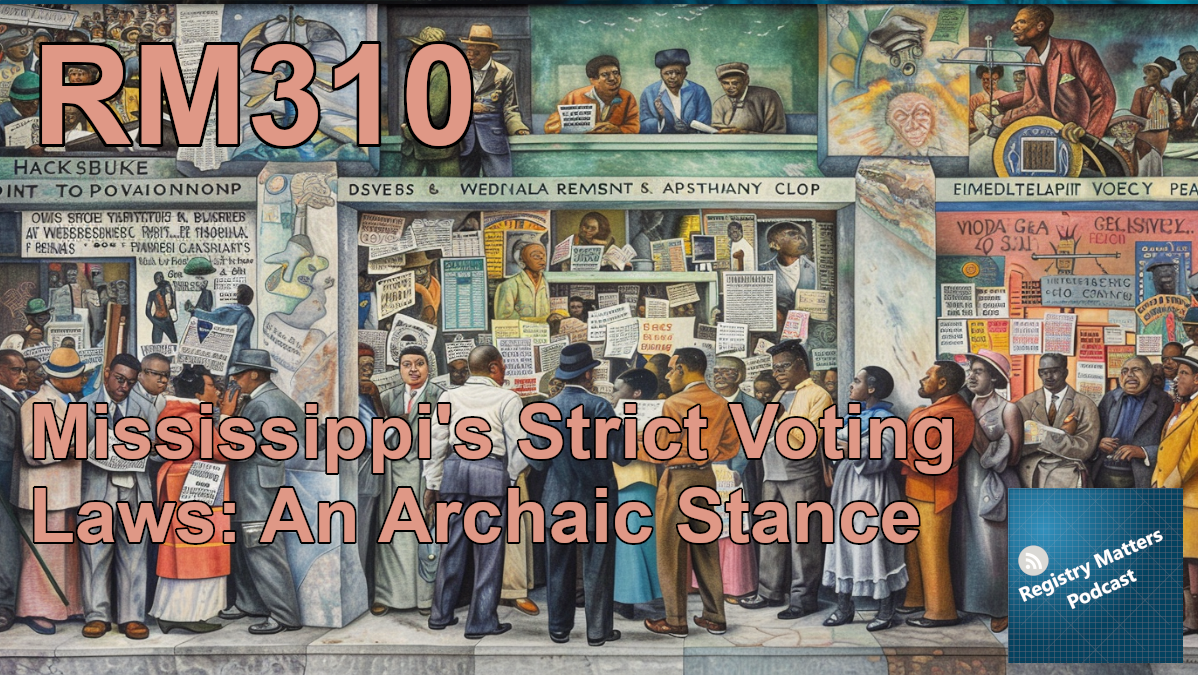[12:38] In this episode, Andy, Larry, and Chance discuss a recent case from the Fifth Circuit Court of Appeals in Mississippi regarding the restoration of voting rights. Mississippi has some of the strictest disenfranchisement laws in the U.S., which bar individuals convicted of certain felonies from voting. The court’s majority upheld the state’s law, stating it is a regulatory function, not a punishment, and does not violate the Eighth Amendment’s prohibition of cruel and unusual punishment. The dissent argues that permanent disenfranchisement undermines democracy and citizenship. The original lawsuit, filed by several disenfranchised citizens and supported by civil rights groups, challenges these laws as unconstitutional. The debate highlights the tension between judicial interpretation and legislative action in the restoration of voting rights.
[28:45] In Nebraska, a new law aimed at restoring voting rights for individuals who have completed felony sentences was challenged by Attorney General Mike Hilgers, who argued it violates the state constitution’s separation of powers. Hilgers emphasized that only the Board of Pardons can restore these rights. The American Civil Liberties Union of Nebraska contended that this opinion could prevent 7,000 residents from voting in November. Despite the official nonpartisan nature of the Nebraska legislature, the three-member Board of Pardons, all Republicans, including Hilgers, Secretary of State Bob Evnen, and Governor Jim Pillen, are in opposition, making pardons unlikely. The decision, occurring months before a significant presidential election, has drawn criticism and could face legal challenges.
[40:21] In a partial legal victory for inmates at the Will County Adult Detention Facility, a federal judge in Chicago ruled that several of the jail’s media and mail policies violate their civil rights. The challenged policies included a ban on internet printouts and media materials, as well as mail from P.O. boxes. Judge LaShonda Hunt found these restrictions unjustifiable under the First Amendment, though she upheld the jail’s ban on “sexual and inappropriate material.” The lawsuit, originating from a 2017 civil rights claim, had expanded into a class action and highlighted the unconstitutional barriers placed on inmates’ access to information and communication.
[49:22] In this episode of “California Corner,” Chance outlines the four essential steps for achieving post-conviction relief and reintegration into the community. The process begins with taking responsibility for one’s actions, which involves being transparent and sincere about past conduct. The second step is expressing genuine remorse, demonstrating deep regret for the harm caused. Developing insight, the third step, requires understanding the underlying reasons for the criminal behavior, which is crucial for preventing re-offense. The final step is creating a post-conviction prevention plan, which involves identifying triggers and establishing a support system to manage them. By following these steps, individuals can effectively reintegrate into society and lead a constructive life.
https://www.registrymatters.co/podcast/rm310-mississippis-strict-voting-laws-an-archaic-stance
Leave voicemail: 747-227-4477
Email us: registrymatterscast@gmail.com
Support us on Patreon: https://www.patreon.com/registrymatters
Join the Discord server: https://discord.gg/6FnxwAQm57
Want to support Registry Matters with some swag: https://shop.spreadshirt.com/registry-matters
Apple Podcasts: https://itunes.apple.com/us/podcast/registry-matters/id1305039280
Google Play Music: https://play.google.com/music/listen?u=0#/ps/Icuxbpzvyti7wtoredipbtiojqy
RSS: https://www.registrymatters.co/feed/podcast/
Spotify: https://open.spotify.com/show/3d75P7Kc37n2l79m89F9KI
YouTube: https://www.youtube.com/registrymatters
The Registry Matters Podcast’s mission is to cover issues surrounding the Registry. We cover cases that will peel back the veneer of what we need to do to change our lives for the better. We cover news articles that spark conversations about the total insanity of this modern day witch hunt. This podcast will call out bad policy and call out those that are making bad policy.
To change things for the positive, we need to act. We are 6-7-8-900k strong. With that many people, plus their friends and family, over a million people are affected by the registry. We should be able to secure donations to hire lawyers and lobbyists to move the agenda in our favor. We need our people to be represented.


B.
July 23, 2024 11:05 amIn the listener question about Rhode Island I’d like to comment that I received similar sentencing after a plea agreement. 15yrs probation while registered with an additional 10yrs RSO requirement after probation. My council was able to avoid the jail time in exchange for the sentencing running consecutively. My understanding is once the plea is agreed to it is binding and barring the high bar of circumstances that would void the plea it will stand. My additional concerns are in Rhode Island you can petition for release from probation after 3yrs. (RI has a high rate of probation) So long as you meet a list of requirements. Some of those are obvious such as no pending charges (in or out of state). I inquired with my lawyer about this and heir in lies my concern. Meeting all requirements of probation including court payments, restitution and any counseling. He said that they are keeping PFRs from meeting the requirements through extending psychological exams and therapies. What would be a strategy of concluding a requirement that is subjective and would benefit the care provider to whom we must pay each session, scheduled sometimes once a week for months or years?